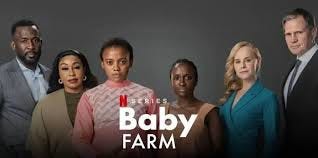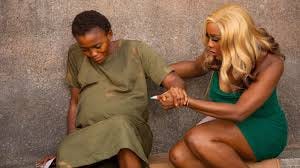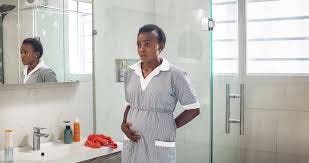Baby Farm: A Thrilling But Flawed Exposé of the Nigerian Underworld Baby Factory
Baby Farm exposes the hidden horrors of Nigeria's underground baby trafficking rings. The limited series plunges us into a harrowing story of desperation, deception, and the commodification of babies.
Baby Farm, a 5-episode Netflix limited series, is an exposé on the hidden horrors of Nigeria's underground baby trafficking rings. Plunging us into a harrowing story of destitution, desperation, and deception, the series reveals the dark truth about a country where women and their babies are commodified behind the guise of charity homes and maternity clinics. Directed with unflinching intensity by Walter 'Waltbanger' Taylour and Kayode Kasum, the series largely succeeds in sustaining tension and character depth, though not without occasionally tripping over narrative excesses.
Set in the bubbling but brutal city of Lagos, the story follows Adanna (Oyinye Odokoro), a young woman whose unintended pregnancy sets off a chain of events that disclose the gloomy underbelly of a society obsessed with fertility and corruption, revealing the predatory schemes of faux altruism and the complicity of wealth and power.
Already shattered by her pregnancy, Adanna’s life unravels after her boyfriend is sent off to Lagos by his mother. Rejected by her own family and uncertain about her future in the village, she travels to Lagos to search for her boyfriend to build a life together. After a few days of searching, she couldn’t find him. She works as a househelp, hoping to find him someday. A series of unfortunate events makes her destitute in the sprawling city.
After several days of sleeping and struggling on the streets, Adanna is brought to The Evans Foundation Clinic by a sex worker. She feels relieved to leave the harshness of the street behind, believing that the well-equipped clinic will nurture her and her baby. However, the clinic, managed by the chillingly composed Dr. Oliver Evans (Langley Kirkwood) and his devoted wife, Sister Barb (Jenny Stead), isn’t a place of comfort but a place of torment. It takes Adanna days to realise that the clinic is a covert, sinister place where young women, dubbed “Makers,” are coerced into breeding infants for sale to wealthy couples under the guise of adoption.
Besides Adanna’s woeful plight, the series’s most compelling theme is its exploration of Nigeria’s cultural obsession with fertility, where childlessness is a deep-seated stigma. This societal pressure drives Cherise Oku (Rita Dominic), a glamorous but infertile actor, whose wealth cannot shield her from the sneers of in-laws, internet gossips, and the ache of an empty womb. Cherise’s longing to have a set of twins, though, has made her a tabloid fixture, and she will do anything she can until she has them. Her husband, Akin (Joseph Benjamin), is a tender opposite. He urges adoption, despite his checkered past of drug crime, making the adoption agency bar them from adopting.
Cherise Oku’s desperation leads her and her husband to Evans's clinic. It ties their fate with Adanna's and reveals the moral decay hidden beneath their privilege. NGOs like The Evans Foundation often cloak themselves in benevolence. They are, however, business enterprises that please “narcissists and exhibitionists, who are too vain to wreck their bodies, yet want babies and attention that come with them”. These foundations are bolstered by the endorsements of their rich and famous ambassadors, who host glitzy fundraising events, where celebrities, sometimes unaware of the barbarity of the foundations, pose for photo ops.
Willing to pay Evans’s exorbitant sum for a set of twins, not caring where and how they are gotten, implicates Cherise in the chain of suffering of the poor and vulnerable women. And when confronted with horrifying truths about The Evans Clinic Foundation’s atrocious crime, she decides not to see Dr. Evans. She hastily leaves the country to avoid being roped in the crime. This act shows that those in privileged positions frequently avoid accountability, preferring to protect their names rather than helping to curb evil practices. It also brings the hypocrisy of the elites to light, showing how their desperation for children fuels a market that preys on hapless women.
Baby Farm doesn’t stop at personal stories. It spread wider, critiquing the ecosystem that enables such exploitation. It exposes how people participated in the terror for monetary benefit. Sex workers sell vulnerable girls to the foundation, and the thugs moonlight as spies, guards, and executioners for Evans’s operation. This network of everyday complicity, a grim reality of moral decay and survival economics, depicts how oppression is sustained not just by the rich and powerful but by those willing to profit from another person’s pain.
The law, too, bends to the whims of wealth. And the poor are left to the uncertainty of karma for justice. This point is driven home in a searing confrontation between Evans and Sister Barb as she pleads with him to end their monstrous enterprise. “We haven’t gone far enough,” Dr. Evan vehemently says. “There is no law here. Money is the law. We are the law.” This chilling declaration, made all the more damning when, towards the end of the series, the Inspector General of Police, bought by Dr. Evans, grants him impunity. He advises Dr. Evans to burn his office to erase the evidence, neglecting the plight of the vulnerable girls entrapped by the foundation.
Despite its few brilliant moments, Baby Farm isn’t without its missteps.
The exploration of Adanna’s life on the street before being taken into the clutches of the Evans Foundation Clinic is too abrupt. A couple of scenes lingering on her, heavy with pregnancy, living rough on the streets, or escaping danger, would have deepened our investment in her plight. This would make her predicaments and eventual entrapment feel less like a plot device and more like an inevitable tragedy.
The subplot involving Joy (Folu Storms), a brash gossip blogger hunting Cherise’s secret, is thinly drawn. The show offers little context for her drive. No hint of personal stake or history with Cherise. She's doing everything for gossip, which isn't compelling. When she discovers Cherise visits The Evan Foundation Clinic, her reckless pursuit of the truth (what truth, exactly?) and how she handles it result in her tragic demise. A more measured approach might have elevated her from a caricature to a credible threat and made her death painful.
Another hard flaw to overlook is how Ify (Kiki Omeili) and Ebun (Genoeva Umeh) casually move Joy’s dead body around the busy, prying street of Lagos in daylight, without being seen or intercepted by anyone, especially the Nigerian police. In a city notorious for traffic congestion, street vendors peeking into cars, and curious bystanders, this implausibly strains the show's credibility and momentarily shatters its carefully built-up tension.
Likewise, the series occasionally leans on tired tropes: Adanna’s late-game transformation into a gun-wielding avenger is forced. The sudden shift lacks psychological groundwork—there is little in Adanna's earlier characterisation to suggest she is capable of handling a gun, let alone her ability to face a desperate man wielding a gun. The sacrificial death of supporting character Ebun (Genoeva Umeh) to save Adanna is predictable to a fault. These moments undercut the show’s otherwise sharp commentary, ruining its potency with melodrama.
Baby Farm is a provocative but imperfect watch. It’s a visceral indictment of exploitation disguised as charity, and an examination of how the rich and society perpetuate cycles of harm to the downtrodden. Though it’s not subtle, it doesn’t always trust its audience to connect the dots. It, regardless, remains a worthy revelation: it restrained acting performances and unflinching focus on its subject make it impossible to ignore.







